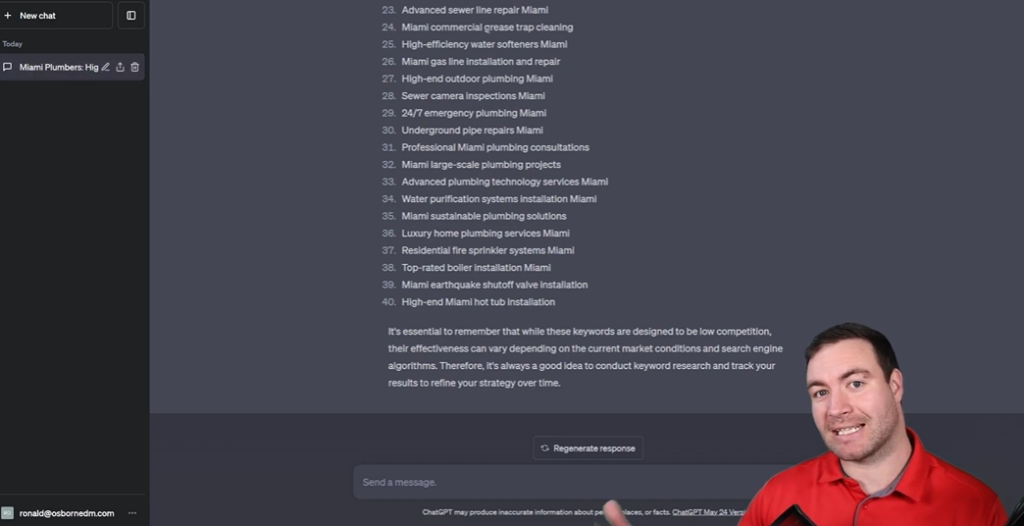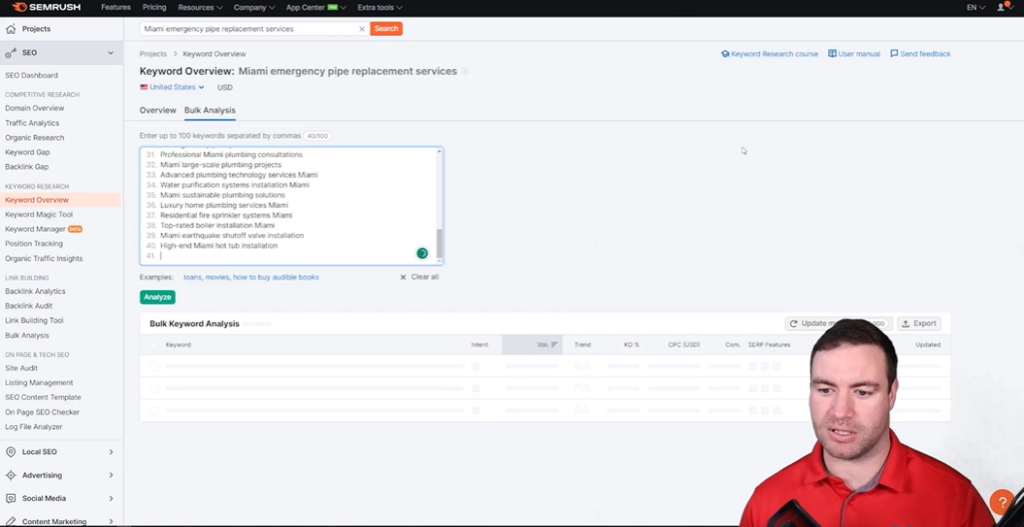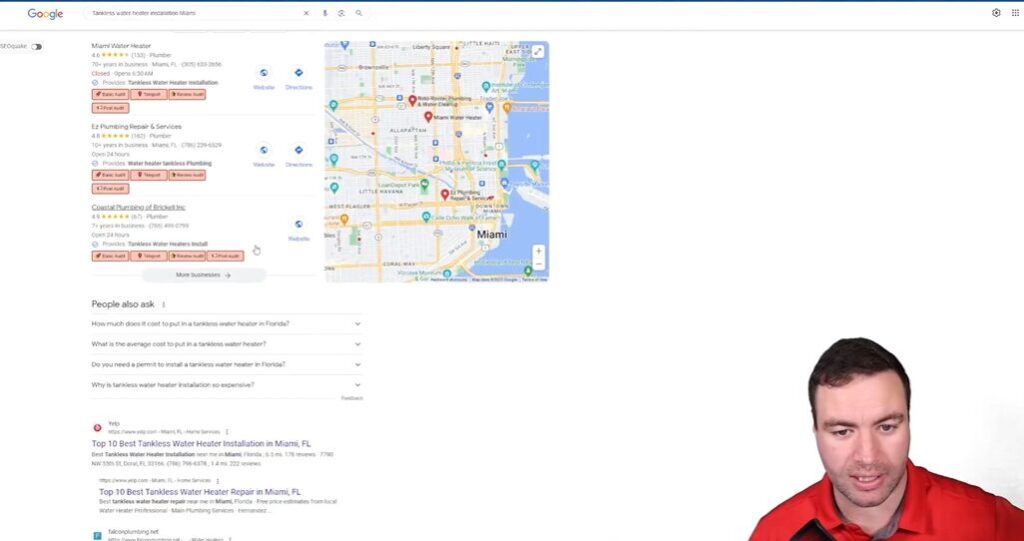Have you ever felt lost when faced with keyword research, especially in a niche you’re not familiar with? I remember the first time I was tasked with optimizing a plumbing website. I knew nothing about pipes or water heaters, yet I had to find keywords that could drive traffic. Thankfully, with tools like ChatGPT and Semrush, I transformed my panic into a plan. Let me take you through my discoveries toward successful SEO strategies!
TL;DR: Using ChatGPT and Semrush can simplify keyword research, helping you on how to find low comp keywords that attract customers without high competition.
Let’s talk about something crucial in keyword research: inspiration. I can’t stress enough how important it is to find that initial spark when diving into a new area. Whether you’re working on an SEO plan for a plumbing website or a real estate blog, having the right keywords can make or break your ranking. But how do we uncover those hidden gems?
Inspiration isn’t just a feel-good word; it’s the backbone of effective keyword research. Think of it like this: you wouldn’t embark on a road trip without a map, right? Well, keywords are your map in digital marketing. They guide people to your content. When you identify the right keywords, you help others find what they need.
Now, let’s explore how unfamiliarity can actually breed creativity. For instance, if you’re new to a field, your fresh perspective can lead to innovative keyword choices. You might notice something seasoned pros overlook. This happened to me when I first started working with clients in roofing. I asked simple questions - “What do people often get wrong about roofing?” The answers opened up a treasure trove of keywords.
Sometimes, the best prompts come from everyday questions we often ignore. Start tuning into conversations around you. Pay attention to what people ask or search for regarding your niche. For instance:
By transforming these inquiries into keyword prompts, you create a list that speaks directly to your audience. Think of these everyday questions as a mirror reflecting what your potential customers are interested in. This strategy not only enhances your keyword list but also makes your content more relatable and engaging.
Let’s say I’m landing a new plumbing client. I could ask, “What makes a good plumber?” or “How can I fix my leaky faucet?” Each one of these questions can be crafted into keywords, driving traffic to my client’s site. It’s like striking gold. Sometimes, it’s just about asking! What questions are floating around in your niche?
The journey to finding keywords doesn’t have to be traditional or dull. Let your curiosity lead the way, and the right keywords will follow.

I’m excited to dive into one of the most essential aspects of digital marketing: keyword generation. With tools like ChatGPT, we can streamline our research and discover valuable keywords that we might not think of otherwise. So, how do we effectively use ChatGPT for keyword creation? Let’s look at some methods.
Using ChatGPT feels like having a powerful brainstorming partner. Imagine you've just landed a plumbing client in Miami. You want keywords that capture high-ticket offerings, right? You might start with a straightforward prompt:
“Give me a long list of low competition keywords that are higher ticket items for a plumber in Miami.”
This simple query can yield a treasure trove of ideas in seconds! Instead of spending hours searching, you can generate a robust list in just moments.
Every industry is unique. Here are some tailored prompts you can use for various fields:
Feel free to modify these based on your niche. The beauty of ChatGPT is its flexibility! It can adapt to your specific needs, making it a versatile tool.
Once I gather keywords, the next step is understanding search volume versus competition. Not all keywords are created equal. You could find a keyword with significant searches, but if the competition is stiff, you may want to reconsider. For example, a phrase like:
“Tankless water heater installation Miami”
might have low competition but only twenty searches a month. Does that make it worthwhile? It depends on how targeted your marketing efforts are.
Analyzing the SERP with tools like SEMrush will give insights. If seasoned competitors dominate the first three spots, it might signal a challenging keyword environment. Always consider both aspects to find optimal keywords that are manageable.
In the world of keyword research, we want those “golden opportunities.” Sometimes, it’s about leveraging tools wisely and asking the right questions. I hope these tips on how to find low comp keywords inspire you to tap into the wondrous capabilities of ChatGPT for discovering keywords!

When it comes to finding the right keywords, Semrush is a tool I rely on. It’s straightforward once you know how to navigate through the process. So, let’s break it down together, shall we?
First things first, you need to gather your keywords. Here’s how I do it:
Next up is analyzing the Search Engine Results Page (SERP). Why is this step critical? It informs you about the competition you'll face.
Once I assess the SERP data, it's easier to determine if I can realistically compete for that keyword. If it seems manageable, I’m ready to move on.
So how do I pinpoint the most valuable keywords? Here are my tips:
One of my favorite parts of this process is discovering hidden gems. You’d be surprised at what low competition, high-value keywords are out there. For instance, I once stumbled upon "Miami bathroom remodel" - it had just the right metrics.
So there you have it! The art of keyword analysis with Semrush doesn’t have to be overwhelming. Embrace the process, have fun with it, and your keyword strategy will improve in no time. Let’s keep exploring together!

When it comes to improving our online visibility, one of the most effective tactics is researching competitors. But how do we actually analyze the top-ranking competitors in our niche? Let's break it down into simple steps.
To start, I like to identify who my top competitors are. You can do this using tools like SEMrush or even Google. Just type in your main keyword and see which websites pop up. Take note of the ones that appear consistently at the top. Now, here’s a simple exercise: open a few of these pages. What keywords are they using? What headings or tags are they leveraging? This gives us a clearer picture of what’s working in our niche.
Next, it’s time to identify gaps in their keyword strategies. Are there certain keywords they're not targeting? Use SEMrush’s gap analysis feature to discover keywords that your competitors rank for, but you don’t. I call this “keyword hunting.” For instance, if my competitors overlook the phrase “affordable plumbing services in Miami,” I’ve found a potential goldmine!
Now let's talk about long-tail keywords. Why should we focus on them? Well, they often have less competition and higher conversion rates. Think about it - when someone searches for "best tankless water heater installation" instead of just "water heater,” they likely know exactly what they want. This gives us a better chance of fulfilling their needs.
One technique I find useful is to brainstorm a list of potential long-tail keywords related to my niche. For example, if I'm in the plumbing business, I might consider keywords like "emergency plumbing services in Miami" or "eco-friendly plumbing solutions." Each of these phrases targets specific customer needs and helps us stand out from the competition.
So, as we work through these steps, remember: the goal is to find that sweet spot of low competition and high-search volume keywords. This strategy not only attracts visitors but can convert them into paying customers. Let's keep digging for those opportunities!
As we wrap up this discussion, let’s recap the key takeaways from our journey into keyword research and how to find low comp keywords. Mastering this skill takes time, but it's essential for anyone looking to boost their online presence. First, remember that tools like ChatGPT and SEMrush can be game-changers in finding low competition keywords. With ChatGPT, you can generate ideas quickly, while SEMrush helps you analyze the viability and competition of those keywords. This combination saves you both time and effort - what could be better?
Now that you’ve gathered your insights, it’s time to take action. I can't stress this enough: start implementing these strategies today! Don't wait for the "perfect moment." Every little step counts. Whether it's creating a dedicated blog post, refining your website content, or even just sharing what you've learned, putting these strategies into practice is what will elevate your marketing game.
But the journey doesn't stop here. The digital landscape is always evolving. So, my final advice is to stay updated with trends and tools. Follow industry news, engage in relevant online communities, and continuously hone your skills. I often find that being aware of the latest changes can offer new opportunities - whether it’s a shift in keyword trends or the emergence of new tools that can aid in your research.
So let’s summarize. Use tools like ChatGPT and SEMrush to kickstart your keyword research. Ensure you start implementing these actionable strategies immediately. Finally, commit to ongoing learning and adaptation in this fast-paced digital world. If we do these things, I'm confident that we will not only improve our SEO efforts but also achieve significant success in our marketing endeavors.
Let’s turn those insights into action, and I can’t wait to see how you apply these strategies. Here’s to our growth and success!